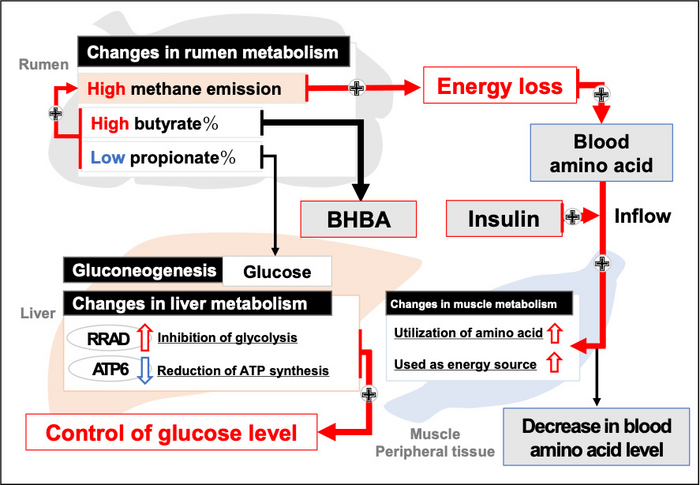Japan’s agricultural sector produced 32.3 million tons of greenhouse gas emissions in 2022, accounting for 2.8% of the country’s total emissions. Nearly a quarter of that stems from enteric fermentation within livestock. Ruminants – grazing animals such as cattle, sheep and goats that acquire nutrients from plant-based diets – give off enteric methane as they decompose and ferment plant materials.

Credit: Tohoku University
Japan’s agricultural sector produced 32.3 million tons of greenhouse gas emissions in 2022, accounting for 2.8% of the country’s total emissions. Nearly a quarter of that stems from enteric fermentation within livestock. Ruminants – grazing animals such as cattle, sheep and goats that acquire nutrients from plant-based diets – give off enteric methane as they decompose and ferment plant materials.
To combat this, researchers have been exploring feed additives and feeding management systems that reduce methane emissions. But this remains limited to certain breeds and feeding environments.
Now, a collaborative project has employed biomarkers to tell us more about the metabolic and nutritional characteristics linked to enteric methane emissions in Japanese Black cattle. The research findings may open up new pathways for researchers exploring methane reduction.
Professor Sanggun Roh from Tohoku University’s Graduate School of Agricultural Science, working alongside the Hyogo Prefectural Technology Center of Agriculture, Forestry and Fisheries, used physiological parameters such as blood metabolites, hormones, amino acids, rumen fermentation, and liver transcriptomes to assess the relationship between methane emissions and metabolic and nutritional features.
“We found cattle exhibiting high enteric methane to have a higher butyrate and lower propionate ratio,” Roh said.
Examining the blood metabolites of steers, Roh and his team also discovered that the concentration of amino acids decreased, while ketone bodies and insulin increased in cattle with significant concentrations of methane. Meanwhile, differentially expressed genes in the liver related to amino acid and glucose metabolism, such as SERPINI2, RRAD, SLC7A5 and APT6, were upregulated or downregulated during the late fattening phase of feeding.
Cattle with high methane emissions actively utilized amino acids to replenish the energy lost during methane production, thereby decreasing blood amino acid levels and increasing blood insulin concentration. This was done without changing the growth and quality of the cattle’s muscle.
“Our results suggest that physiological differences and liver transcriptomes could be applied to monitor the levels of methane emissions from Japanese Black steers,” Roh added. “We are hopeful the relationship in this study leads to new perspectives.”
Details of the research were published in the journal Scientific Reports on July, 1, 2022.
Journal
Scientific Reports
DOI
10.1038/s41598-022-15146-1
Article Title
Physiological responses and adaptations to high methane production in Japanese Black cattle
Article Publication Date
1-Jul-2022




